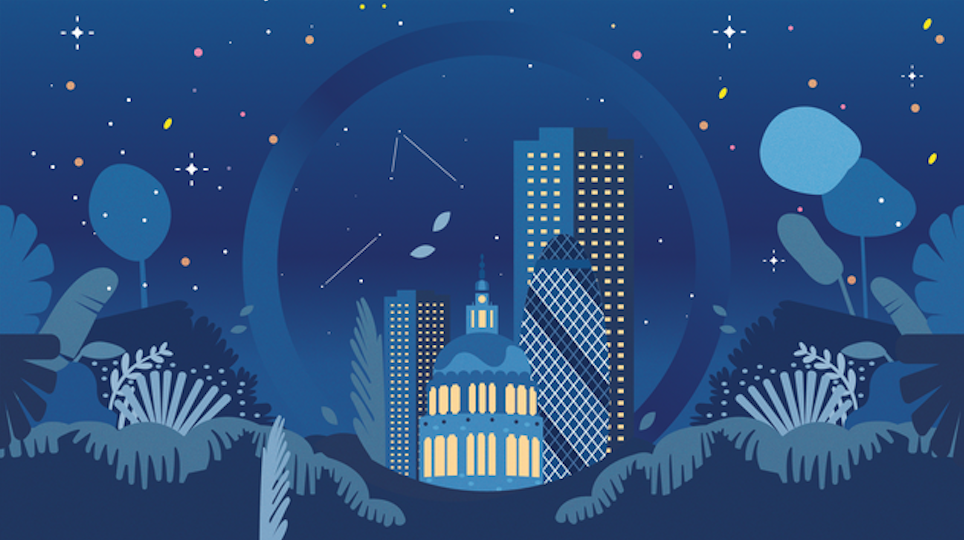
How can we use the night sky to be more present?
When it comes to calming ourselves down and easing anxiety, a tip I share regularly is to go outside and simply look up. When I see the bright blue sky and fluffy white clouds, I’m reminded that I’m a tiny speck on a blue marble in the middle of space. The thoughts that were consuming me, the worries that felt so incredibly important suddenly… aren't. I get a dose of perspective, and feel much more capable of handling whatever it is I’m going through.
So, when I heard about the concept of mindful stargazing, I immediately understood the appeal. When we look up at the night sky, we feel a sense of awe and, according to Mark Westmoquette, astrophysicist, Zen teacher and author, studies have shown that this very experience of awe can boost our wellbeing.
“It helps us put our own worries into perspective, and increases humility and compassion by reminding us there’s more to life than our own selfish needs," Mark says.
“The rhythmical nature of the heavens can also bring comfort. When we look upwards, we see the same patterns of stars as our ancestors, and their ancestors, stretching back to the dawn of time. That consistency and predictability can become our ‘pole star’ in these times of turbulence and change.”
Surrounding ourselves with the dark cloak of night instead of the artificial blue light from our devices could also help reset our circadian rhythms and encourage deeper, more peaceful sleep, Mark explains.
So, how can we take advantage of the resources outside of our window and practice mindfulness through stargazing? Mark’s advice is to start by getting outdoors and sitting or lying down – or, alternatively, open your curtains and look out your window with the lights off, to reap the benefits right from your bedroom.
“Take a moment to make yourself comfortable (with blankets, cushions, a yoga mat, etc.) and arrange your body in such a way that feels balanced, aligned, and relaxed," ark notes. "Purposefully soften your body – relax your face: forehead, mouth, jaw; relax your hands; relax your breath.
“Notice what you see. Don’t worry if there are clouds around, or the glow of streetlights. Mindfulness is about noticing things as they are, putting aside any wishes for how you would want things to be. Allow your eyes to be filled with the vista of the night sky.”

Mark notes that when we first go from a lit room into the dark it can take our eyes up to 15 minutes to fully adjust, so we can use this time to become present in our bodies.
“As your pupils are gradually dilating, take the time to notice your body. How do you feel? How are you breathing? There’s no right or wrong, should or shouldn’t – just allow yourself to be as you are in this moment.
"Mindfulness is about noticing things as they are, putting aside any wishes for how you would want things to be"
“As your eyes get accustomed to the dark, there’s no need to look around," Mark adds. "Just fix your gaze on one part of the sky, and become aware of the whole of your field of vision. Stress tends to make us tunnel-visioned. When we purposefully tune-in to our visual periphery, it sends signals to the body that it’s OK to relax.”
The aim with mindful stargazing, Mark says, is to fully immerse yourself in the experience of looking up at the night sky with inquisitiveness and wonder.
“You don’t need to know what star you’re looking at, or which constellation is which, so you don’t need a telescope or a stargazing app. Do what you can to simply immerse yourself in what you’re seeing, and just appreciate the view.
“If thoughts arise about something else – maybe a memory from the past or a thought about what you might do later – just put them to the side. Bring your attention back to your experience of looking up at the night sky.
“Take in the sights, but also the sounds and sensations. Be conscious of your breath, and how your neck feels as you look up. Listen to the sounds of the night. Take the time to be present with your experience, right now.”
Feeling connected to something outside of ourselves can help to ease any feelings of isolation, and give us a greater sense of purpose. When we take in the sights of the night sky, we can feel a part of the cosmos. “We’re not just citizens of our country, or even planet Earth. We’re citizens of this universe in this moment – in all it’s wonderful, multi-dimensional beauty.”
Learn more about Mark Westmoquette at markwestmoquette.co.uk, and check out his books, ‘Mindful Thoughts for Stargazers’, ‘Stars’, and ‘The Mindful Universe’.
For more information on achieving mindfulness visit counselling-directory.org.uk

